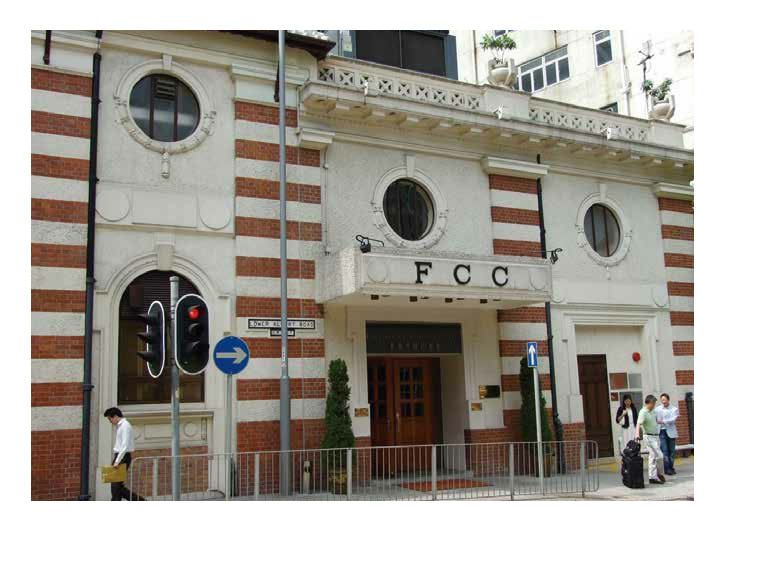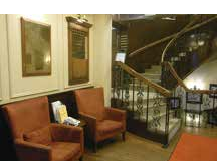Issue:

Based in the former British colony since 1949, the club is finding creative ways to remain relevant through changing times.
The Foreign Correspondents’ Club, Hong Kong, gives off a very different atmospheric vibe than its Tokyo equivalent. While the FCCJ is settled in the top floors of a decades-old tower block in Yurakucho’s “salaryman-land,” the Hong Kong club is housed in a gorgeous old colonial structure in the center of Hong Kong island’s Central district, one of the densest concentrations of money, people and brains in the world. No wonder, perhaps, that it has a two-and-a-half-year waiting list for associate members.
I confess to being a regular of the FCCHK when I was deputy editor of a local finance magazine in the mid-2000s. It was far more pleasant to duck into the club and enjoy their splendid menu of unabashedly colonial foods, sold at low prices, than dine at the pricey and pretentious eateries elsewhere. The fiery curries and mountainous apple crumbles surrounded by lakes of custard were just the ticket if you wanted to prepare yourself for a nap on returning to your desk.
The lingua franca of the FCCHK has remained unchanged from its beginnings. “The language at the club is English,” says Tim Huxley, associate member governor and Treasurer, “both in terms of how members communicate with the staff and how members communicate with each other.” Indeed, the spectacular main bar on the ground floor is populated in the evenings with a blend of nationalities and races, but the local and Asian attendees are clearly very much at ease in the global language.
Adds a Hong Kong-born PR man who prefers to remain anonymous because of his employer’s strict regulations on talking to the media: “I think the FCC lives up to its name. It is viewed by local people as a very international place where issues are discussed and written about which do not just cover Hong Kong.”
The happy buzz around the club can be traced back to the economic vitality that is such a characteristic of the region. “The FCCHK benefits from Hong Kong’s relationship to China and the tremendous opportunities for business that provides,” says Huxley. “But Hong Kong serves as a base for the whole region. Many of our members crisscross north Asia on a regular basis, giving the atmosphere an added interest.”
The FCCHK indeed encapsulates Hong Kong’ enviable status with regard to China. The former colony has traditionally been a conduit into China but under a separate rule of law. Today, that still applies under the “One Country Two Systems” structure, which guarantees a great deal of autonomy to Hong Kong in running its own affairs.
This structure, defending many of the freedoms that the British bequeathed to the new rulers in 1997, is obviously of crucial importance to a press club, which the FCCHK at heart still is (although not quite to the same extent as the FCCJ). The Hong Kong club today is not the first channel for communicating establishment policies and ideas. Nor is it a site for regular press conferences and top speakers who wish to break news. Rather, it has become a forum for intelligent discussion over a wide range of topics. Both regular and associate members are targeted with speakers on current affairs, business and other broadly appealing topics.
When I was a regular visitor to the Hong Kong club, I was drawn by its success as a marvelous social venue first and foremost. The press aspect seemed more or less nostalgic and decorative. The workroom, for example, was (and is still) tucked away in the basement, and there is no library in contrast to the FCCJ’s excellent collection of books and magazines, and two full-time staffers.
“The key is to have an engaged and diverse membership.”

Both club officials consulted for this piece disagreed with this view. Huxley says that journalists are a core part of the club, and that a good balance is kept with associate members. “Journalists understand and appreciate that associate members know a great deal about important issues in the region, and get a lot out of a meeting them,” he says. “Probably that is helped by the fact that both parties can communicate easily in English, wherever they come from originally.”
According to Neil Western, a journalist with a top news organization and First Vice President of the FCCHK, governance is firmly in the hands of the press. Member-ship is tiered in the usual way between foreign correspondents writing for an international audience, local journalists writing for local media and associate members. Journalistic control of the gov-ernance model is assured by a President who is always a well-regarded profes-sional journalist, while of the remaining 16 board members only 5 work in non-media roles currently shipping, law, food, PR and economic analysis.
Western also mentions a discounted introduction scheme in recent years to bring in journalists that has resulted in 200 new regular members so far a big boost to the heart of the club. I asked Huxley whether associate members feel they are unfairly subsidizing feckless journalist members, but he says that is not the case. “It is a symbiotic relationship. Both parties gain from knowing each other. ” In addition, while regular members do get a good deal in the early years of joining, their dues are bumped up a little every year until they are more in line with associate members.
Despite its undoubted success, however, the FCCHK does face some challenges similar to those in Japan. The two most acute issues are the changing media landscape and demographics.
For a start, the core of the traditional press club the gifted, peripatetic and lavishly funded foreign correspondent has almost disappeared amid the vicious cost cuts the industry has faced. In their place have appeared a swarm of bloggers, citizen activists and part-time journalists, who mingle writing with other occupations.
The HKFCC has responded with a concerted effort to get serious journalists from top media groups to join the board, with some success. “It is important for the credibility of the club when dealing with the authorities to have established and reputable names on the board,” says Vice President Western. Indeed, Reuters, Bloomberg and AFP are all represented, although print-media figures are much less in evidence.
In terms of how to cope with bloggers, activists and exjournalists who move to NGOs, jobs that can be difficult to fit into traditional membership rules, Western says each case is judged on its merits. When it comes to making statements, the FCCHK sticks to its issues that relate directly to the media and arranges guest speakers from across the political spectrum for balance. “We’re not activists, we’re journalists,” he says. “We are careful to restrict our comments to strictly media-related issues in Hong Kong and China.”
While emotions have run high during the recent student demonstrations, for example, the FCCHK has only issued formal statements when it believes press freedom has been threatened. In keeping with this philosophy, the club has sponsored the highly regarded Human Rights Press Awards, together with Amnesty International, for the past 18 years. These awards highlight the importance of a skillful and unbiased free press in uncovering abuses, but try not to go beyond that.
Surprisingly, while broadening the demographic is a familiar headache for the FCCJ, it also features in the Hong Kong club. Members are getting steadily older, and female members are almost as few in number as Tokyo. The average age of the members is 50, while the number of under-35’s is just eight percent, according to the club website. Despite targeting young local reporters, the fact is that the group is made up of essentially low-paid jobbing writers who would probably prefer to move into a more lucrative occupation. Freelance Western writers in Hong Kong find it a tough market, given the “poverty-level wages in the media industry,” says Huxley, and the high cost of living in Hong Kong.
Even the positive role of the wire reporters, who are heavily represented on the FCCHK board, is not guaranteed to continue. Under pressure from high rents, some are relocating outside Central. Reuters moved to Taikoo Shing several years ago, an area that is far enough away from the club to reduce participation. And Kowloon has recently become an important competitor to Central as well.
It seems to me that the FCCHK has been smart in focusing on turning the club into a superb social venue with good intellectual content, rather than fussing too much on the purity of its journalistic pedigree. As Huxley points out, “the key is to have an engaged and diverse membership.” Is it more important for a new member to be a bona fide journalist or a brilliant engineer who has designed tools for the U.S. space program? It is hard to say. Journalists are traditionally well positioned to push an agenda of transparency and honesty, but given the rapid structural changes in the industry it is not clear whether that will always be the case. All that can be said for the moment is that the Foreign Correspondents’ Club, Hong Kong is an interesting study in how different groups are responding to the need for a place that helps the gathering of reliable and insightful information.
Dan Slater is a Tokyo-based writer and consultant. You can read his blog at www.thedelphinetwork.com

